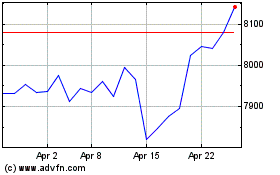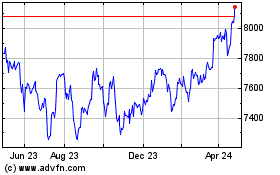U.S. Stocks Fall to Start 2021
January 04 2021 - 11:46AM
Dow Jones News
By Joanne Chiu and Anna Hirtenstein
U.S. stocks slipped on the first trading day of the year,
dragged down by losses across everything from manufacturers to
beverage makers.
The Dow Jones Industrial Average was last down 463 points, or
1.6%, to 30142. The S&P 500 fell 1.4%, and the Nasdaq Composite
was down 1.3%.
Investors are starting off the new year fixated on the same
issue that dominated markets for much of 2020: the coronavirus
pandemic. Although money managers acknowledge the pandemic is far
from over, many are holding out hope that economic activity will be
able to pick up later this year.
"There is still really bad news on the virus, but the market is
looking through that because of the vaccines," said Fahad Kamal,
chief investment officer at Kleinwort Hambros. "We are certainly
positively tilted, given the expected economic recovery,
historically low interest rates, a lot of fiscal spending and
monetary policy to come: all of that positivity remains."
Still, analysts warn that in the near-term, many companies still
look vulnerable to financial pressures.
Coca-Cola, which was downgraded by RBC Capital Markets to
"sector perform" from "outperform," lost 3.5%. Analysts at the bank
believe the pandemic will continue to limit major public events and
dining at restaurants, potentially hurting demand for Coca-Cola's
products.
Boeing shares fell 3.4% after Bernstein analysts cut their
rating for the stock to "underperform" from "market perform,"
citing the risk that the aerospace giant could face substantial
compensation claims from customers awaiting delayed orders.
Tesla bucked the trend Monday. The electric-car maker rose 4.9%
after saying it delivered a record 499,550 cars last year, just shy
of its half a million target.
Overseas, the pan-continental Stoxx Europe 600 rose 0.8%, paring
earlier gains.
The U.K.'s FTSE 100 added 0.8%. The trade deal struck on
Christmas Eve between the U.K. and the European Union is likely
delivering a boost to British stocks, said Sebastian Mackay, a
multiasset fund manager at Invesco.
"A lot of the tail risks of a no deal [Brexit] have been removed
now. This will lead people to start dipping their toes again in the
U.K. market," he said.
Investors also said they were reassured by newly released data
on the health of the manufacturing sector. Factories in Asia and
Europe increased their output as 2020 drew to a close, according to
surveys of purchasing managers that showed strong rises in activity
during December.
"We're going through renewed lockdowns, which is curtailing
activity to some extent, but what we've seen through the pandemic
is that manufacturing activity tends to hold up quite well," Mr.
Mackay said.
Among European equities, British gaming company Entain soared
28% after it confirmed a takeover bid from MGM Resorts
International. The offer values the company at GBP8.09 billion,
equivalent to $11.06 billion.
Most major stock benchmarks in the Asia-Pacific region advanced.
South Korea's Kospi Composite led gains, rising 2.5%.
China's Shanghai Composite gained 0.9%, even after a private
survey showed China's manufacturing activity moderated in December
due to weak demand for the country's exports.
Ben Luk, senior multiasset strategist at State Street Global
Markets, said the data pointed to continued fragility in the
Chinese economy. But he said that helped ease concerns that China's
central bank would act prematurely to tighten monetary policy.
Japan's Nikkei 225 dropped 0.7% by the end of trading after
Prime Minister Yoshihide Suga said he might declare a state of
emergency in Tokyo and surrounding areas as new coronavirus
infections continue to rise.
Paul Sandhu, head of multiasset quant solutions for the
Asia-Pacific region at BNP Paribas Asset Management, said markets
in Asia had largely picked up where they left off in 2020, as
investors continue to favor riskier assets like equities in
emerging markets such as China, South Korea and Taiwan. He said he
expected Asia to be one of the most robust parts of global markets,
due in part to its relative success in containing the
coronavirus.
Akane Otani contributed to this article
Write to Joanne Chiu at joanne.chiu@wsj.com and Anna Hirtenstein
at anna.hirtenstein@wsj.com
(END) Dow Jones Newswires
January 04, 2021 11:31 ET (16:31 GMT)
Copyright (c) 2021 Dow Jones & Company, Inc.
FTSE 100
Index Chart
From Mar 2024 to Apr 2024

FTSE 100
Index Chart
From Apr 2023 to Apr 2024
